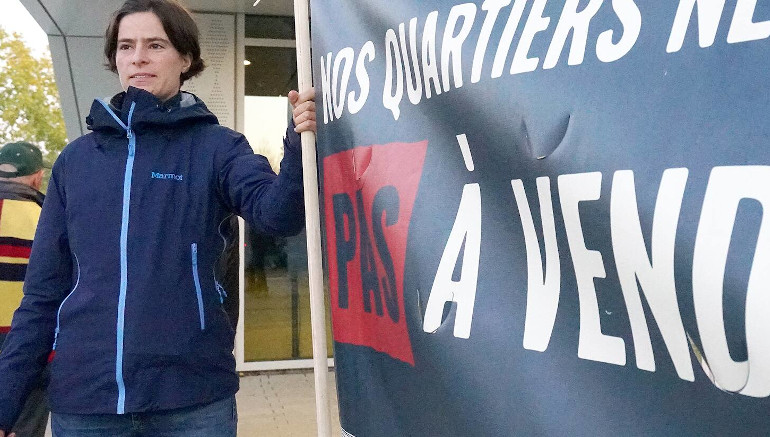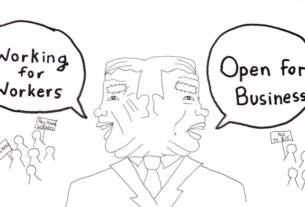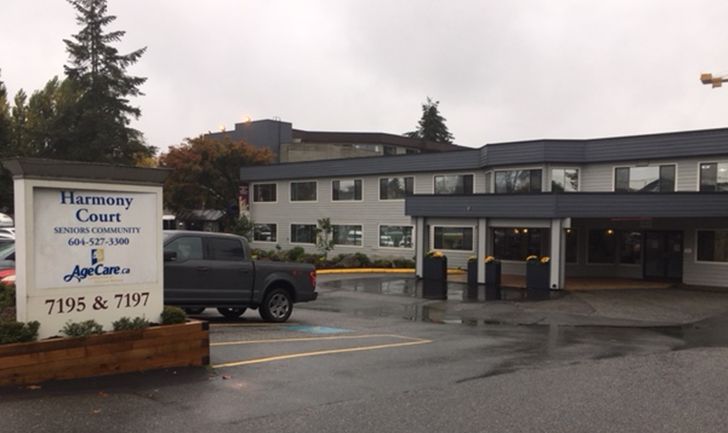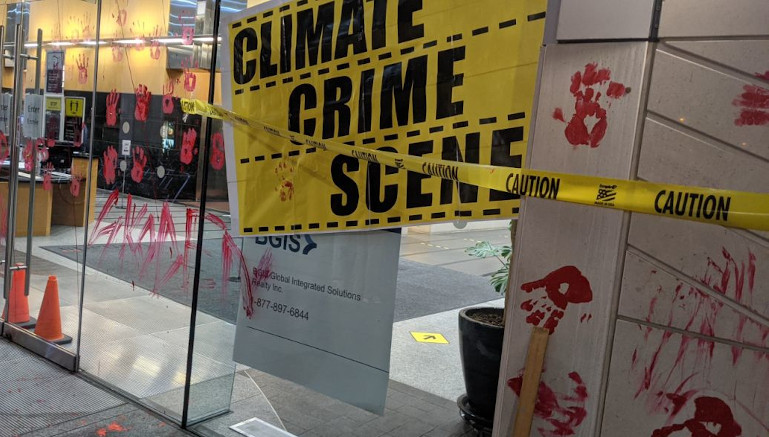Militant electioneering and a socialist policy meet with significant support in Quebec.
Rosalie Bélanger-Rioux’s team garnered 1,050 votes in the municipal elections on November 7, 2021 in Montreal. Her militant grassroots campaign has shown how elections can be used to broaden the tenants’ struggle movement in Verdun, a borough in the southern part of Montreal.
The electoral support for Rosalie (11.98%) places her in 3rd position in her district. She also came in third place in terms of the number of votes cast for the 17 independent candidates across Montreal. This support also exceeds that given to the majority of candidates of the third largest party, “Mouvement Montréal.”
This success shows that it is possible to seek support with an openly socialist program and methods of action based on the militant organization of the people of the neighborhood. The support for Rosalie shows the growing attraction for radical political change in Quebec, for a socialist alternative. Above all, it demonstrates the interest shown in a team which was already immersed in the heart of the tenants’ struggles before the elections, and which has continued to animate them during the election campaign.
The need to organize on the ground
Rosalie’s election campaign drew its relevance from the fact that it did not stop at collecting votes merely to put a councillor in the borough hall. Widespread cynicism, low participation rates in elections and political polarization all underline how this type of strictly electoral parliamentarism is being increasingly rejected by voters.
Brought to power with a majority in the 2017 municipal elections, “Projet Montréal” and its mayor Valérie Plante have presided over an accelerated gentrification of the neighborhoods of Montreal, in particular in Verdun. Homelessness has doubled and makeshift camps have been systematically destroyed. Police departments are inundated with new money, while transport services are experiencing cuts.
Only a balance of power based on the widespread and militant organization of Montrealers can force the administration to give us what we really need. Rosalie’s campaign is a modest first step that demonstrates the potential for this type of approach.
Helping the militant organization of tenants
The campaign succeeded in mobilizing around 20 volunteers at an early stage — not only to give visibility to the candidate, but to help Verdun tenants organize themselves against their bad landlords and their negligent municipal council. Organizer of the “Our neighbourhoods are not for sale” campaign, Rosalie was able to use her electoral campaign to fuel the fight for the right to housing.
Volunteers roamed the streets of Verdun to distribute more than 6,500 flyers and discuss the fight against gentrification with hundreds of citizens. Volunteers have been particularly mobilized to help the tenants of Godin Street in their fight against a gentrifier who threatens to evict them. Rosalie and her team are the only people involved in the election race who actively supported their struggle, despite appeals made to other councillors.
These tenants had come to ask Rosalie for help during the “welcoming committee,” a protest action organized by her team during the public debate between those aspiring to be mayor of Verdun on 19 October. This action, covered by several media, forced the candidates of Ensemble Montréal and Projet Montréal to quickly react.
Involving the people of Verdun
During Rosalie’s campaign, dozens of people donated a total of over $3,000. This war chest made it possible, in particular, to print thousands of leaflets as well as to buy giant placards and posters on which urgent demands were clearly visible: “Let’s stop renovictions!” “Expropriate for housing!” or “Tax the super-rich to finance public services!”
The campaign’s militant approach won us a lot of support in the streets of Verdun, but also internationally. Socialist Seattle City Councillor Kshama Sawant — behind the city’s victory for the $15/hour minimum wage and Tax Amazon — sent Rosalie a letter of support. Drawing inspiration from Kshama and her party, Socialist Alternative, the fight for housing rights in Verdun will not end with the elections!
Behind Projet Montréal’s victory: fading support
The “tidal wave” for Projet Montréal on November 7 hides a drop of 26,226 votes in support for Valérie Plante compared to the 2017 elections. Support for right-wing populist Denis Coderre from Ensemble Montréal has fallen even further, by 57,596 votes. Created in 2021, Mouvement Montréal is the only party to have made significant gains with its 30,200 votes. But it failed to get anyone elected.
The Montreal municipal elections show a low voter turnout of 38.4%, a drop of 4% from the 2017 elections. By comparison, the 2021 federal elections saw a much higher turnout at 62%, and the Quebec elections of 2018, 66.45%. In both cases, however, voter turnout fell by 5% compared to the previous elections.
Across Montreal, the highest participation rates are to be found in the wealthiest boroughs, such as Outremont and L’Île-Bizard-Sainte-Geneviève. Conversely, the lowest participation rates are found among the most disadvantaged boroughs, for example Montréal-Nord and Saint-Laurent.
Abstention and Projet Montréal
In 2017, the high abstention rates seemed to have worked in favour of Valérie Plante’s team. This situation happened again this year. In fact, the choice of only 19.56% of all those able to vote in Montreal was enough to re-elect Valérie Plante.
In other words, Projet Montreal was able to win the mayoralty without having to bother about 80% of the electorate. It was enough for the party to mobilize the vote of the educated and relatively well-off social strata that support it. Worse yet, many people say they voted for Projet Montréal with their noses held in order to avoid a return of Denis Coderre’s team. The avenue of “strategic voting” for the least-worst candidate did not encourage people to vote, on the contrary.
What is extremely obvious is that the vast majority of voters in Montreal — over 685,000 — did not vote for any party or candidate at all.
Abstention, a class question
Should we really be surprised by the low participation rates — especially in the more working-class districts — when there is no alternative party stemming from the workers’ and social movements? When political rhetoric does not address the concerns of ordinary working class people? When elected officials first and foremost defend the interests of the bosses, entrepreneurs and landowners?
The overwhelming majority of people know that no matter who sits in the mayor’s office, they can only expect transport service cuts, rate hikes, overpriced rents and poorly paid jobs. The deterioration of the living conditions of the majority of the population has accelerated with the economic and health crisis. The working class will remain largely inactive without a dynamic political alternative committed to radically turning the tide and defending its interests. Now is no longer the time for business as usual, but for political audacity.
A developing social conscience
The support for Balarama Holness and his party, Mouvement Montréal, partly expresses new popular anger in the face of systemic racism, police violence and the fight against inequalities. Created this year, the new party presented 68 candidates who performed especially well in working-class neighbourhoods where a very large part of the population are immigrants.
This support suggests a potential for radicalization, but does not reflect the dynamics of those collective struggles currently raging in the neighbourhoods. For many people, interest in Mouvement Montréal was mainly due to the specific identities of its candidates.
Although symbolically important, skin colour, ethnicity or gender of the candidates are not a guarantee of social transformation. In the same vein, the petty-bourgeois media and political elite make the same mistake by rejoicing too quickly at the “hope” emerging from the election of young careerist mayors, including female mayors, all over Quebec.
But there cannot be “feminist” gentrification or “anti-racist” policing. There cannot be an “ecological” capitalist local economy or cultural industries that respect the rights of Indigenous peoples and Quebecers. Municipal policy that revolves around the interests of private companies and big landowners will maintain oppression and continue making profit from exploitation. The real change will come with those who are prepared to take head-on the people who buy our neighbourhoods, pollute our living environments and pay starvation salaries.
A fighting policy
The difference between Rosalie’s candidacy and all the others is that Rosalie calls for building a movement beyond the elections, an activist movement of workers, young people and pensioners in all their diversity. While Balarama Holness contents himself with telling us the next fight is the election in 2025, Rosalie Bélanger-Rioux proposes to remain mobilized and to act now!
Projet Montréal will only fulfill its most ambitious promises — such as building 6,000 affordable housing units per year for 10 years — if it is forced to do so. Only a massive grassroots movement can establish this balance of power. Let’s organize now to demand the expropriation of abandoned, vacant or neglected land and buildings at the next municipal council meetings! Let’s organize the pressure by mobilizing the people of the neighbourhood, our unions, our student associations and our militant organizations! We will then be able to see what the elected representatives of Projet Montréal are really worth.
A massive protest movement can lay the foundations for the working-class and those social forces in Montreal, which are active in their communities, for joint struggle for their rights. With a common socialist project, the political representation of such a social movement could radically change the way we live in Montreal.




